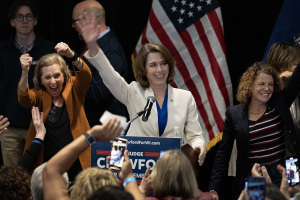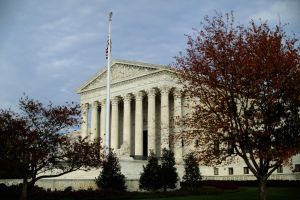Keeping Christ in Christmas Is What's Important In December, Not Politics
The stage for the first Christmas was set by a politician-Caesar Augustus. The backdrop was a political policy: a census of the Roman Empire-"of all the inhabited earth," in the words of Luke 2:1. Everyone knows the story. Joseph and his young bride, heavy with child, travel from their adopted hometown of Nazareth to their ancestral hometown of Bethlehem. And there, in the House of Bread, the village of David, the King of Kings and Lord of Lords was born-Jesus, the Christ.
The secular and the sacred-intermingled at one of the most significant events in human history.
It seems Christmas and politics have always dovetailed into one another, especially in our modern age. In language reminiscent of the 1990s, it isn't politically correct to call Christmas trees or Christmas plays "Christmas." And Christmas displays on public property-if you're politically sensitive-should be accompanied by more secular versions of Christmas (Santa and Rudolph and Frosty) or by oxymoronic versions of Christmas (signs extolling the mythology of Christ's birth or images of the evolutionary progression of humans from apes). And you must never say, "Merry Christmas." It might offend. "Happy Holidays" is the seasonal greeting for the politically correct.
Of course, it's easy to scoff at politically hyper Grinches and Scrooges. But in truth, for too many Americans, on the right and the left, politics has become their source of meaning, their religion, and their faith. For these, politics has become transcendent, even existential. The mundaneness of politics (the practice of the possible) is, for them, the mandate of politics (the promise of the impossible).
But all politics all the time is not good for our souls or for our society because it leaves little time for other pursuits-many of which are more important than politics-and it debases human flourishing, hollowing out goodness, beauty, and truth.
There was a day when politicians didn't think that politics was the most important thing in life. In a letter written on May 12, 1780, to his wife, Abigail, John Adams said:
The science of government-it is my duty to study, more than all other sciences. The art of legislation and administration and negotiation ought to take place, indeed, exclude in a manner, all other arts. I must study politics and war that my sons may have liberty to study mathematics and philosophy. My sons ought to study mathematics and philosophy, geography, natural history, naval architecture, navigation, commerce, and agriculture in order to give their children a right to study paintings, poetry, music, architecture, statuary, tapestry, and porcelain.
Civilization and culture, Adams believed-at its highest aspirations-was in the study and enjoyment of human creativity, not in the organizing principles of politics.
For more than a century after the founding generation passed from the scene, Adams's countrymen applied themselves to the study of science and art. And politics, when it touched upon the lives of the people at all, excluding wars and economic depressions, was local and slight.
Today, however, politics is national and heavy. Even those politically disengaged or uninformed can't escape the reach of Washington; not with its regulations of health care, the bulbs that light our homes, and the toilets that . . . well you know.
To be sure, the science of government is good and necessary. But government is merely the steel and stone of the societal foundation; it isn't the house or home. When the whole house is nothing but foundation, life becomes hard in its coldness, dull in its sameness, and bleak in its gloominess.
And this is what politicizing Christmas does. It threatens to turn all of us into Scrooges and Grinches.
But we should humbug the politicization of Christmas. For while the political decree of the census of 4 BC set the stage for the greatest story ever told, that's all that it did-set the stage. The play took place in a cattle stall in Bethlehem.
Christ's mass-the celebration of Christ's advent-that is the play. It was then and should be now.
Derrick G. Jeter is a speaker and writer engaging ideals at the crossroads of faith and freedom. A noted speaker on faith, liberty, politics, culture, and history, Derrick writes a popular blog at derrickjeter.com and is the author of O America! A Manifesto on Liberty. Follow him on Twitter @derrickjeter.





























